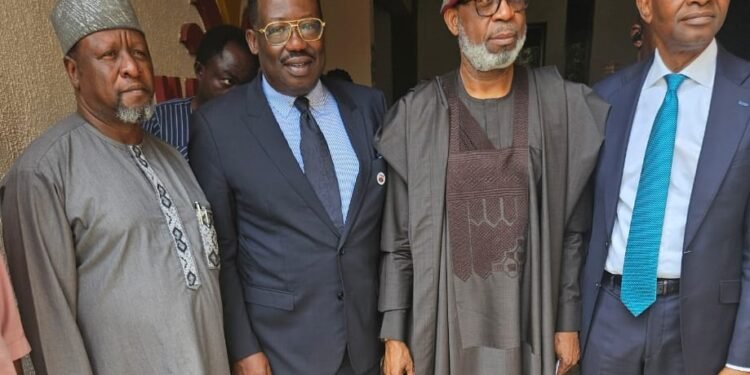By Seyi Babalola
The Minister of Solid Minerals Development, Dele Alake; National President of the Nigerian Association Chambers of Commerce, Industry, Mines and Agriculture (NACCIMA), Dele Kelvin Oye Esq., and key stakeholders in the Nigeria solid minerals sector converged on Abuja, the Federal Capital Territory (FCT) to chart the course for the development of Nigeria’s mining industry and explore opportunities for economic growth.
Speaking at the BusinessDay Mining Conference, with the theme, ‘Digging deeper: Diversifying Nigeria’s economy for wealth creation’, Alake shared insights into the government’s vision for mining solid minerals, outlining policy initiatives, regulatory measures, and low-hanging fruits to accelerate sector development.
Oye, during his session on how to optimise the contributions of the Artisanal and Small-scale Mining (ASM) sector, said if properly managed and harnessed, the sector can be a catalyst for rural development, poverty alleviation, and economic growth.
Identifying challenges impeding the growth of the sector, Oye said poor regulation, lack of training and technical support, among others were hampering the country’s effort to attract needed investments in the sector.
According to him, “In Nigeria, like in many resource-rich countries, ASM plays a significant role in livelihoods and the national economy. It is a sector that, if properly managed, could be a catalyst for rural development, poverty alleviation, and economic growth. However, it is also a sector fraught with challenges, including environmental degradation, unregulated activities, and the negative consequences stemming from illegal mining.
“The question of how Nigeria can harness the potential economic benefits of ASM while mitigating its negative consequences is one that requires a multi-faceted approach, where the government, the private sector, and local communities collaborate to create a sustainable and equitable mining industry.
“Firstly, the government must strengthen the regulatory framework governing ASM. This includes clear and transparent policies that differentiate between legal and illegal mining activities. By ensuring that laws and regulations are not only well-crafted but also effectively enforced, we can create an environment where legal miners are supported and illegal miners are deterred.”
He continued: “Secondly, the government should invest in capacity building and provide technical support to artisanal and small-scale miners. This can be done through training programs that teach sustainable and safe mining practices, as well as business skills to help miners operate more efficiently and gain access to finance.
“Thirdly, the establishment of independent, private-sector-led mineral buying centers across key mining areas can revolutionize the supply chain. These centers would serve as hubs where ASM operators can sell their minerals at fair market prices. This initiative would not only formalize the ASM sector but also curb illegal trade, improve traceability, and ensure that economic benefits are enjoyed by local miners and the Nigerian economy.
“Moreover, it is essential that these mineral buying centers operate with the highest standards of transparency and accountability, integrating with the national banking system to ensure that transactions contribute to the formal economy. The centers would also play a pivotal role in ensuring that miners are paid fairly and promptly, thus incentivizing legal and responsible mining practices.”
Oye further noted, “Environmental sustainability must also be a cornerstone of the ASM sector’s development. The government should incentivize miners to adopt environmentally friendly mining techniques by providing access to modern equipment and technologies that minimize environmental impact.
“Finally, the government and private sector must engage with local communities to ensure that ASM activities are carried out with respect to local rights and in a manner that contributes to local development. This includes fair compensation for land use, investment in community infrastructure, and respect for indigenous traditions and cultures.”
“In conclusion, Nigeria has the opportunity to transform its ASM sector into a model of sustainable development. Through a robust regulatory framework, capacity building, the establishment of private-sector-led mineral buying centers, environmental stewardship, and community engagement, we can ensure that ASM becomes a driving force for economic growth, social development, and environmental protection,” he added.
Reassuring NACCIMA’s commitment to fostering public-private partnerships to drive the growth of the sector, Oye said, “As President of NACCIMA, I am committed to fostering a collaborative approach that leverages the strengths of the government, private sector, and local communities. Together, we can harness the potential of the ASM sector for the benefit of all Nigerians.”










